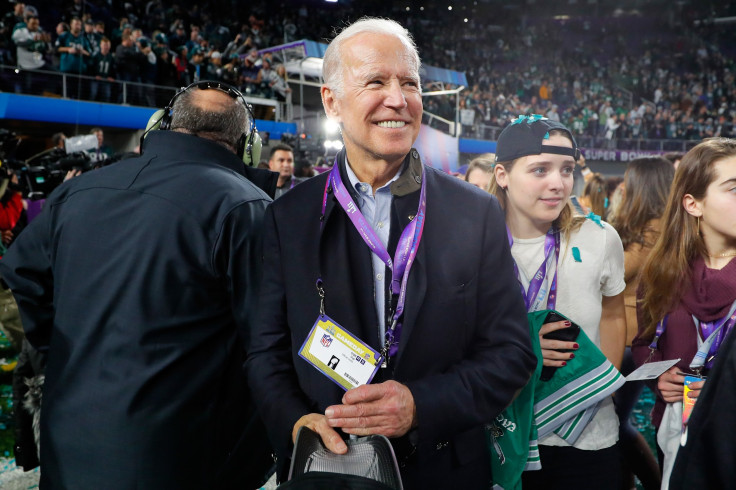Election 2020: A Look At The Top 10 Democratic Candidates

As the field vying for the Democratic nomination grows, there has been no shortage of poll movement among the candidates ahead of the first debate in Miami on June 26.
There are currently 24 candidates vying for the nomination after the entry last week of New York City Mayor Bill de Blasio. Despite the sheer number of candidates and the potential for runoffs in the primaries, frontrunners are emerging well in advance of the Iowa caucuses in February.
Former Vice President Joe Biden, arguably the most recognizable candidate in the field, has taken a clear lead in at least four polls since his late entry into the race. After President Trump named him “Sleepy Joe,” Biden’s fundraising in the first 24 hours soared to $6.3 million, the largest single-day take of any candidate, nosing out Vermont Sen. Bernie Sanders’ previous same-day record of $5.9 million and former Rep. Robert "Beto" O'Rourke's record of $6.1 million.
Pete Buttigieg: "Kim Jong Un is a murderous dictator and Vice President Biden served this country honorably."
— The Hill (@thehill) May 29, 2019
EARLIER: Trump agrees with Kim, rips Biden at Japan presser https://t.co/KGzrNIaGgT pic.twitter.com/gCQH18hExx
That’s not the only way in which Biden has maintained a lead over Sanders and the field. In polls by Monmouth University, Quinnipiac University, Morning Consult and Fox News, Biden has more than a 2-1 lead over Sanders. Political website TheHill.com in February ranked Sanders third behind Biden and California Sen. Kamala Harris, who has since dropped from first to fourth in rankings by the Hill.
Biden, 76, has billed himself as the best candidate to defeat Trump, in part because of his blue-collar roots in Scranton, Pennsylvania, along with his appeal to non-white voters, which is possibly due to serving under Barack Obama.
Sanders, the longest sitting Independent senator in the U.S. history, is ranked second. Sanders has significant resources after raising $18.2 million in the 41 days between his announcing candidacy and the end of the first quarter. The 77-year-old also has a long record of consistency, having espoused Democratic Socialist views for decades.
This is insane: As Oklahoma and Arkansas face catastrophic flooding, and Ohio and Indiana reel from tornados, Trump is trying to undermine the very science that proves climate change is real. We need policy based on facts, not rightwing ideology. https://t.co/GfEb5O7G7Y
— Bernie Sanders (@SenSanders) May 29, 2019
Massachusetts Sen. Elizabeth Warren, who moved up to the No. 3 spot, is increasingly challenging Sanders' position as the most reliably liberal candidate in the field and appears to be enjoying an uptick in popularity of late. The New York Times noted Tuesday how "Some online supporters have even taken to calling her "Likable Liz" in an attempt to rebuff notions she is only a policy wonk."
Meanwhile, Warren has been one of the few candidates to outline specific stances on issues and her campaign scaffolded that strength with the slogan: “Warren has a plan for that.”
Before @StevenMnuchin1 became Treasury Secretary, he was on the board of @Sears, where he helped gut the company and fire thousands of employees. Now, @AOC and I have some tough questions for him. pic.twitter.com/hS25rPOsYa
— Elizabeth Warren (@SenWarren) May 23, 2019
While Warren’s campaign seems to have been energized, the Harris campaign may have slowed, as she has dropped off from No. 1 to No. 4 in the Hill's rankings. There might be some early concerns as to what platform Harris is running on. As Christopher Cadelago of Politico points out, "Harris’ one-sentence rationale for wanting the presidency is less clear" than other frontrunners. Harris, however, has enjoyed strong support from the Democratic base for her no-nonsense approach in opposing Brett Kavanaugh's Supreme Court nomination.
Rounding out the Hill's top five is South Bend, Indiana, Mayor Pete Buttigieg, a 37-year-old relative unknown who has jettisoned into the upper ranks while lambasting Vice President Mike Pence. Buttigieg, the only openly gay candidate on either side of the contest, recently addressed complaints that he didn't have an Issues section on his official web page by inserting an extensive list of where he stands on hot-button topics.
The remaining candidates in the top 10, include O’Rourke, who has stated the country needs “to be able to bring in a new energy," and Sen. Cory Booker of New Jersey, who has taken strong positions on abortion rights and gun control.
There is also Sen. Amy Klobuchar of Minnesota, who has touted herself as "Heartland Amy," and former Secretary of House and Urban Development Julian Castro, who has made Trump’s immigration policies his signature issue.
Also in the field is underdog candidate Andrew Yang, a 44-year-old businessman, who has attacked tech giants while pushing for alternative efforts to help the average American worker.
© Copyright IBTimes 2025. All rights reserved.





















